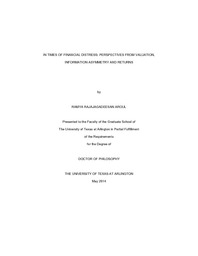
ATTENTION: The works hosted here are being migrated to a new repository that will consolidate resources, improve discoverability, and better show UTA's research impact on the global community. We will update authors as the migration progresses. Please see MavMatrix for more information.
Show simple item record
| dc.contributor.author | Aroul, Ramya Rajajagadeesan | |
| dc.date.accessioned | 2017-05-31T19:22:33Z | |
| dc.date.available | 2017-05-31T19:22:33Z | |
| dc.date.submitted | January 2014 | |
| dc.identifier.other | DISS-12630 | |
| dc.identifier.uri | http://hdl.handle.net/10106/26675 | |
| dc.description.abstract | The dissertation addresses unanswered questions in asset valuation through the lens of financial distress in three different asset markets namely equity market, residential property market and REITs market. The first two essays explore the valuation impact of financial distress in equity and residential property markets while the third essay examines the role of information asymmetry in REITs market around credit rating announcements. In the first essay, I investigate why highly distressed firms earn low returns. By employing a direct misvaluation measure, I find that distressed firms with substantial overvaluation earn negative returns. I also further study the characteristics of the overvalued distressed firms by examining the joint roles of short-sale constraints and heterogeneous beliefs in the financial markets. The second essay advances the knowledge of the distressed sale discounts associated with residential properties during the Liquidity Crisis of 2008 and subsequent housing market crisis in California introducing a new and important temporal and geographic perspective. Using a unique set of instrumental variables for time on market, I find that the discounts on distressed properties varies over time and sub-markets but are consistent across different model specifications. In the third essay, I examine the informational content of REITs' changes in their long term or unsecured credit ratings and empirically test the presence of insider trading, prior to the announcements. I find that credit rating downgrades disseminate some new information to market participants prior to the liquidity crisis while they lose their informational content post crisis. While news of credit rating upgrades appears to be more transparent before the crisis, they provide relevant new information after crisis. I find evidence of insider trading prior to credit rating upgrades post crisis and it is present among REITs with high information asymmetry and poor corporate governance. Also, an analysis of the magnitude of REIT abnormal returns on possible explanatory variables points towards market condition as being a significant moderating variable. | |
| dc.description.sponsorship | Rodriguez, Mauricio | |
| dc.language.iso | en | |
| dc.publisher | Finance & Real Estate | |
| dc.title | In Times Of Financial Distress: Perspectives From Valuation, Information Asymmetry And Returns | |
| dc.type | Ph.D. | |
| dc.contributor.committeeChair | Rodriguez, Mauricio | |
| dc.degree.department | Finance & Real Estate | |
| dc.degree.discipline | Finance & Real Estate | |
| dc.degree.grantor | University of Texas at Arlington | |
| dc.degree.level | doctoral | |
| dc.degree.name | Ph.D. | |
Files in this item
- Name:
- Aroul_uta_2502D_12630.pdf
- Size:
- 4.238Mb
- Format:
- PDF
This item appears in the following Collection(s)
Show simple item record


